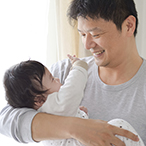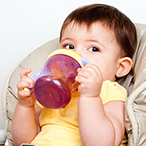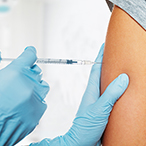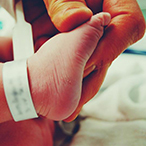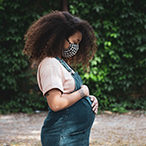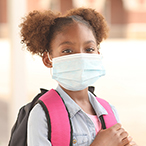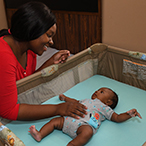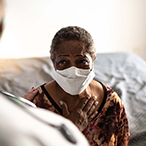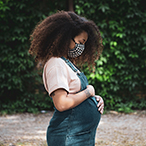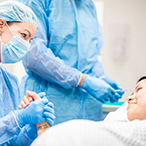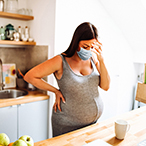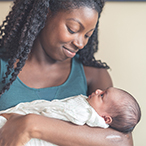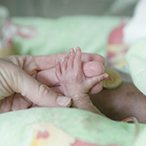Specialized regions in infant brains appear to respond to visual information in much the same way adult brains do, according to a study funded by the National Institutes of Health. Located in the visual cortex, these brain regions selectively process faces, bodies, or scenes. Previously, researchers had believed that it took years for these regions to develop before they would function like an adult’s visual cortex. The findings may provide information helpful for understanding disorders in which facial recognition is impaired, such as autism spectrum disorder and bipolar disorder.
News
NICHD issues News Releases and Media Advisories to the news media. Spotlight and Research Feature articles explain NICHD research findings and public health issues to the general public. An Item of Interest is a short announcement of relevant information, such as a notable staff change.
Science Update: Infant seizure risk increases after cooling therapy rewarming, NIH-funded study suggests
Newborns who undergo whole body cooling after oxygen deprivation—proven to prevent brain damage and death—have a high risk of seizures during the rewarming phase of the treatment, suggests a study funded by the National Institutes of Health. The findings indicate that infants’ brain waves should be continuously monitored for seizures during rewarming, which may otherwise go undetected and lead to disability or death.
Science Update: Juice consumption before 6 months linked with sweet beverage consumption in later childhood, NIH study suggests
Children who were given juice before they were 6 months old drank more juice and soda, and less water, by early and mid-childhood, on average, than children first given juice at or after 12 months, according to a study conducted by researchers at the National Institutes of Health. The findings support a theory that giving children sweet foods and drinks at an early age fosters a preference for sweet tastes that persists into childhood, increasing the risk for childhood weight gain and tooth cavities.
Science Update: No serious adverse events from COVID-19 vaccine in breastfeeding women or their children, NIH-funded study suggests
No serious adverse events were reported by 180 breastfeeding women receiving either the Pfizer or Moderna vaccine, either among themselves or in their infants, according to a study funded by the National Institutes of Health. For the mothers, adverse events included muscle and body aches, fever and vomiting, pain, redness, swelling, or itching at the injection site.
Science Update: Newborn genome sequencing information does not contribute to family distress, NIH-funded study suggests
Receiving detailed genomic information on their newborn’s potential risks for childhood and adult diseases does not appear to cause distress or anxiety among parents, suggests a study funded by the National Institutes of Health. The findings could help to allay concerns that routinely sequencing newborn genomes to obtain information about their long-term health prospects may be too stressful for families.
Science Update: Maternal antibody treatment fails to reduce infant cytomegalovirus infection, NIH-funded study suggests
An antibody treatment in early pregnancy for women infected with cytomegalovirus does not appear to reduce the risk of infection or death among their newborns, an NIH-funded study suggests. The findings contradict several smaller studies on the treatment, known as hyperimmune globulin, that suggested the treatment was effective.
Science Update: Home visit program after birth may reduce incidence of child maltreatment, NIH study suggests
A program providing new parents with one to three home visits from a nurse soon after the birth of a child was associated with 39% fewer child protective service investigations for maltreatment through age five, compared to parents who received usual newborn services, according to a study funded by the National Institutes of Health. Families receiving the visits also had 33% fewer emergency department visits.
Item of Interest: How is COVID-19 Affecting Children’s Daily Lives? Preliminary Data Offers Fresh Insight
Preliminary data from NICHD-funded researchers provides caregiver-reported information on how children and teens fared during the first months of the COVID-19 pandemic.
Director's Corner: One Year of Rapid Acceleration of Diagnostics, and Anticipating New Challenges
Looking back and looking ahead. NICHD Director Dr. Diana W. Bianchi joins other leaders across NIH in reflecting on the work of the Rapid Acceleration of Diagnostics (RADx) program and discussing plans for the future.
Release: NIH, DC government form partnership to reduce sleep-related infant deaths
The National Institutes of Health and the District of Columbia government are teaming up to raise awareness among District parents and caregivers about how to reduce the risk of sudden infant death syndrome and other sleep-related causes of infant death, such as accidental suffocation.
Director's Corner: Advancing Research to Understand, Treat, and Prevent Long COVID
For many COVID-19 patients, full recovery remains elusive even long after they should feel “better.” NIH recently announced research opportunities to understand COVID-19 long haulers, who have what researchers now refer to as Post-acute sequelae of SARS-CoV-2 infection (PASC). NICHD joins these opportunities while remaining focused on PASC patients within our audiences of interest—pregnant and lactating people, children, and those with disabilities.
Media Advisory: NIH calls for greater inclusion of pregnant and lactating people in COVID-19 vaccine research
Pregnant people need to be protected through research rather than from research, the authors contend.
Director's Corner: Including pregnant and lactating people in SARS-CoV-2 vaccine research
As the COVID-19 pandemic persists, SARS-CoV-2 vaccines offer the potential to halt the spread of the virus. Yet, we know very little about the effectiveness and safety of the vaccines during pregnancy.
Media Advisory: Severe COVID-19 in pregnancy associated with preterm birth, other complications
NIH-funded study suggests mother-to-infant transmission appears to be rare
Science Update: Childbirth during COVID-19 pandemic associated with anxiety, post-traumatic stress symptoms, NIH-supported study suggests
Increased stress may interfere with adjustment to new motherhood, mother-infant bonding
Spotlight: Selected NICHD Research Advances of 2020
Read about NICHD’s research findings and activities from 2020.
Media Advisory: Higher red cell transfusion threshold offers no advantage for treating preterm infants
Very low birthweight infants often need blood transfusions to survive. A National Institutes of Health-funded study suggests that providing a higher threshold of red cells within accepted limits offers no advantage in survival or reduction in neurological impairment over a lower threshold.
Media Advisory: Infant opioid withdrawal therapy varies widely by treatment site
Medical care for newborn infants who were exposed to opioids in the womb varied widely across 30 hospitals nationwide, according to a study funded by the National Institutes of Health. The study authors say that the findings underscore the need for clinical trials to determine the most effective treatments.
Spotlight: Medical Rehabilitation Research Center Marks 30th Anniversary
The National Center for Medical Rehabilitation was established in 1990 through the landmark Americans with Disabilities Act.
Release: Postpartum depression may persist three years after giving birth
National Institutes of Health study suggests women with mood disorders, gestatational diabetes may have a higher risk.
 BACK TO TOP
BACK TO TOP
